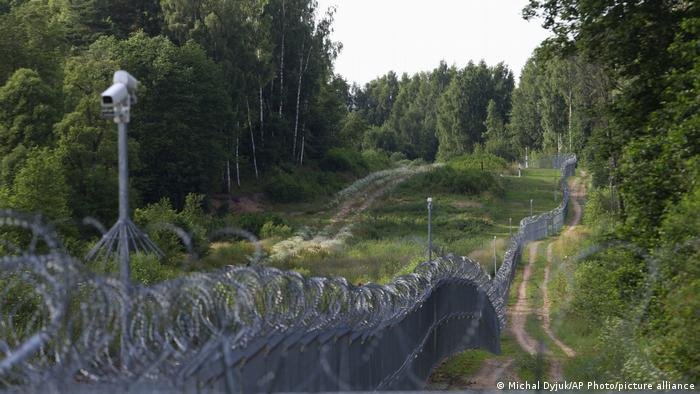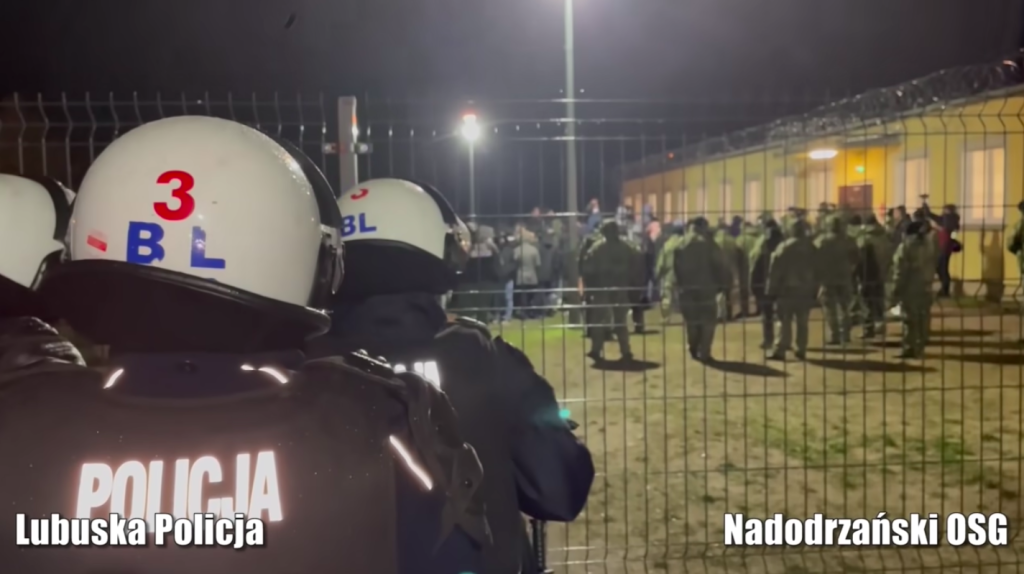Syrian man reportedly ‘fighting for life’ in Poland after falling off …
A Syrian migrant is "fighting for life after falling off a border wall" between Belarus and Poland, says broadcaster Al Jazeera. Recently more people have begun attempting to cross the border into the EU. "A Syrian national is fighting for his life in a Polish hospital, having fallen from a border wall in his attempt to flee Belarus and find safety elsewhere in Europe," the Qatar-based broadcaster Al Jazeera[1] reported on Monday (April 17).
The Syrian man was named as Mohammad* by Al Jazeera, and had reportedly fallen from the five-meter-tall border wall on April 7. According to his brother Abdul*, who flew from Cyprus to be with his brother, Mohammad broke both his legs during the fall.
"He could die today or tomorrow." A Syrian refugee is fighting for his life in a Polish hospital, having fallen from a border wall in his attempt to flee Belarus and find safety elsewhere in Europe ? https://t.co/4KGQGvtfbr[2]
-- Al Jazeera English (@AJEnglish) April 17, 2023[3]Mohammad reportedly lost his two farms and his house during the war in Syria and decided to try to reach Europe via Belarus[4] earlier this year.
His brother said he paid about EUR12,780 to be taken to the Belarus-Polish border.
'Potentially fatal complications'
But now, due to an infection in the wounds he sustained during the fall, Mohammad is facing "potentially fatal complications." Doctors are considering whether they will need to amputate one of his legs to stop the infection from spreading further in his body. Abdul spoke to Al Jazeera by phone, his voice cracking with emotion, as he told the broadcaster "he could die today or tomorrow...I don't think we have a chance." According to Abdul, Mohammad's wife is currently in Lebanon.
It is unclear whether the Polish embassy to Syria, which is currently based in Lebanon because of the war, would grant Mohammad's wife a temporary visa to come and visit him.
'I fell down in shock'
As Mohammad continues to fight for his life, his daughter, who lives in Germany, has been visiting his bedside at the hospital in Bialystok in eastern Poland. She told Al Jazeera, "when I saw my father, I fell down with shock, but the doctor didn't help me up. Instead, he asked me how my father got here."
She said that while she was at the hospital, the Polish police sent an officer who could speak German to see her, it seemed to her they wanted to accuse her of being involved in people smuggling. The woman told Al Jazeera that she thought the actions of the Polish police were "clearly racist" and that this left her with a mixed feeling of "shock" and "fear." Al Jazeera reported that the police has since apologized to the daughter.
They told the broadcaster that "officers visited the hospital to confirm that the daughter was a family member and to check if she was in Poland legally."
A 'heart-wrenching' case
Poland's new deputy ombudsman, Wojciech Brzozowski, meanwhile told TVN24 that he was aware of Mohammad's case as he had received a request to intervene in the case, as reported on Polish News. He said he found Mohammad's story particularly "shocking" and "heart-wrenching," and acknowledged that he must be in "agony" while facing a serious condition. Brzozowski also confirmed the daughter's account, saying she had been living in Germany legally for the last seven or eight years, and that as soon as she had arrived at the hospital to see her father, the doctors had informed border patrol authorities.
However, he also said that once the border police had arrived, they had behaved "very well."
Regular crossing attempts
As the number of people attempting to cross the border from Belarus has started to increase in recent weeks once more, the Polish border guard and other authorities are continuing to clamp down on irregular migration. In the last week alone, hundreds of migrants from Bangladesh, Congo, Nigeria, Yemen, Pakistan, Somalia, Cameroon, India, Syria and Afghanistan have been detected trying to cross[5] the border from Belarus into Poland. On April 15, the border guard said they had detected a total of 43 migrants attempting to cross the previous day, including 10 migrants from Syria, five from India and five from Afghanistan.
On April 16, they said they had detected a total of 68 migrants trying to cross, including some from Pakistan and Somalia as well as two from Cameroon and three from Congo, and on April 17, they posted that around 84 had been detected trying to cross the previous day.
 From file: Poland is now also building a 200-kilometer fence along its border with the Russian enclave of Kaliningrad, following Lithuania's lead | Photo: Michal Dyjuk/picture-alliance
From file: Poland is now also building a 200-kilometer fence along its border with the Russian enclave of Kaliningrad, following Lithuania's lead | Photo: Michal Dyjuk/picture-alliance
Polish authorities are currently also building a wall on their border with Kaliningrad[6], the Russian enclave, which will include an electronic barrier, barbed wire and huge steal tubes. The wall is expected to stretch for almost 200 kilometers and will comprise the latest detection technology to try to prevent anyone from crossing without permission.
Bariera elektroniczna na granicy????bedzie miala dlugosc prawie 200 km.Zainstalowanych zostanie 2 tys.slupow kamerowych,3 tys.kamer wideo oraz 700 km kabli zasilajacych,transmisyjnych i detekcyjnych.Rownolegle prowadzone sa roboty zwiazane z budowa Centrum Nadzoru w Ketrzynie. pic.twitter.com/N9r1ZiNMXr[7]
-- Straz Graniczna (@Straz_Graniczna) April 18, 2023[8]Deaths at the border
Poland and other Baltic countries bordering Belarus and the Russian enclave have accused Belarus and Russia of using migrants as a "hybrid weapon." They say that they have deliberately promoted packages promising migrants an "easy way into Europe[9]," with many coming from the Middle East. In February this year, at least four bodies[10] were found at the Polish-Belarus border, reported the European Council on Refugees and Exiles (ECRE).
Reportedly, one of them was a young Ethiopian woman[11] who, they said, had been left "unassisted despite alerts to the Polish authorities." Reports of pushbacks and arbitrary detention have also been coming out of the region, including from Poland and Latvia. Also read: A barbed wire curtain, Poland fortifies border with Russia[12]
The woman, Polish activists told ECRE, was left "lying on the ground, huddled up." Near to her, they said was a "Christian prayer book with pictures of saints." The local border monitoring group Grupa Granica said the woman had crossed into Poland from Belarus as part of a group of seven people, although three of them were immediately pushed back to Belarus, Grupa Granica claim. The remaining four stayed in Poland, but the woman reportedly began to lose consciousness in the cold. Her companions reportedly went to ask for help, alerting the Polish border guard and the police.
They were told that the authorities would help the woman, but then pushed the three migrants back into Belarus and didn't reach the woman before she was found dead by activists. Katarzyna Czarnota from the Helsinki Foundation for Human Rights told ECRE: "Unfortunately, contact with uniformed officers ended with pushback, and not providing help to a person in need. The search was resumed by activists."
Almost 300 missing
On February 16, according to Grupa Granica, three more bodies were found at the border.
At least 37 deaths have been confirmed in the area since summer 2021, when greater numbers of migrants began attempting to cross from Belarus into EU countries, many of them using the border with Poland. According to ECRE, almost 300 people have been reported missing since this particular migrant route became popular. Antoni Mantorski from Grupa Granica told Al Jazeera that he thought the warmer weather conditions of recent weeks were also causing more people to attempt the crossing into Poland.
Death of another Syrian national in Poland
According to the English-language publication Middle East Monitor (MEM), the Polish Border Guard also "publicly admitted the death of [another] Syrian man at a detention center for refugees in south-western Poland" last Thursday.
The admission, reports MEM, came almost a month after the man is reported to have died. Quoting the Polish Press Agency (PAP), MEM says the man of Syrian origin died on the night of March 17. Maria Ksiazek, a psychologist who works with migrants in the camp, told the Turkish news agency Anadolu that the man had been "denied medical help for several days, despite his friends begging for it."
"Inmates said violence was used against him; he was kicked in the stomach when he was already squirming on the ground in pain," added Ksiazek. The psychologist clarified that these were "allegations, and all needs to be confirmed," but said she feared that any investigation "will not be public and not of a high standard."
'Fear of possible reprisals'
Ksiazek said that many of those who claim to have witnessed the treatment of the man were also being held in detention centers, adding that they may not wish to repeat their allegations for "fear of possible reprisals." A spokesperson for the District Prosecutor's Office, Marta Petkowska, told PAP that an investigation had been intiated to determine whether the man's death came as a result of unintentional manslaughter or not.
"The autopsy of the young man's body did not give a definitive answer as to the cause of his death. No injuries or marks ... , which could have caused his death, were found on his body. Samples have now been taken for histopathological examination, and we are waiting for the results," Petkowska said.
Petkowska added that after questioning witnesses in the same center, "their testimonies do not indicate that there was any incident involving the deceased man."
 FROM FILE: A detention center for migrants in Western Poland was the scene of a riot in November, 2021 | Screenshot from a YouTube video by Lubuska Police
FROM FILE: A detention center for migrants in Western Poland was the scene of a riot in November, 2021 | Screenshot from a YouTube video by Lubuska Police
Detention centers in Poland
Amnesty International have said that there are as many as six such detention centers in Poland, where migrants who do not have permission to be in the country are being held. According to MEM, Amnesty said that some of the people held in these centers "have been subjected to violence." They added that there are also some minors held at the centers without parental care.
At the beginning of the year, four Iraqi migrants being held at one of the detention centers began a hunger strike to protest the conditions in which they are being held. Even Poland's former Deputy Commissioner for Human Rights, Hanna Machinska, said she thought Poland was in "decidedly bad shape when it comes to respecting human rights." Machinska, reported MEM, said she had seen "oppression; we see inhumane treatment.
There is political approval for this." Machinska, however, was dismissed from her position in December 2022.
Following this, many of the other members of the committee resigned at that time, reported the English-language Polish News.
*Not their real name, changed by Al Jazeera to protect the family's identity
References
- ^ Al Jazeera (www.aljazeera.com)
- ^ https://t.co/4KGQGvtfbr (t.co)
- ^ April 17, 2023 (twitter.com)
- ^ Europe via Belarus (www.infomigrants.net)
- ^ trying to cross (www.infomigrants.net)
- ^ their border with Kaliningrad (www.infomigrants.net)
- ^ pic.twitter.com/N9r1ZiNMXr (t.co)
- ^ April 18, 2023 (twitter.com)
- ^ easy way into Europe (www.infomigrants.net)
- ^ at least four bodies (www.infomigrants.net)
- ^ young Ethiopian woman (www.infomigrants.net)
- ^ A barbed wire curtain, Poland fortifies border with Russia (www.infomigrants.net)